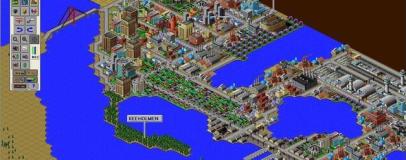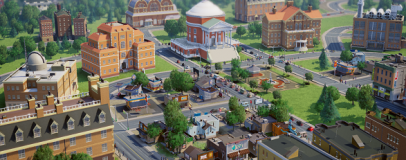Any deviation away from this model quickly established itself as a huge amount of work for no real return on investment. A subway would indeed be cool, but expensive and mostly pointless. Varying your city with light residential districts - instead of heavy - might make things more aesthetically pleasing, but it hobbles your ability to maximise your population. Switching to wind power might sound good on paper, but you need a lot of it to get the same output as that coal plant.
The thing is Sim City 2000 didn't actually give you a solid win state for the game and it was pretty much a pure simulation. There's a failure state in that if you run out of money, the army come along and remove you from power, but not once does it explicitly tell you that you need to make lots of money and grow your population. It was only my 10-year-old game-brain that super-imposed the acquisition of wealth and the growth of the population as the overarching goal, because I was used to playing games where you have to make numbers bigger.

We are all still in this mentality really and I would bet that all of you have at some point heard someone complain about The Sims, or Minecraft using the words "but there's no point to it". It's fairly common and we have been thoroughly trained to treat games this way. Escaping the mentality of self imposed restrictive win-states is difficult, especially when branching away from the beaten track proves so unproductive.
Sometimes, thinking of a computer game as a game in the traditional sense is enough to mark its downfall. Most of Will Wright's other titles bear the hallmarks of a game that isn't really a game. Many a person had the realisation that The Sims was not really something that was played, but more tweaked and watched for a bit, and yet probably still fell into optimising the daily lives of their digital people. The Sims was talked about with investors as a virtual doll house and even originally talked about in gaming magazines as a soap opera simulator which really is a more accurate description than game, but there was still that implied objective: Acquire wealth and make progress.
If a game features numbers, the instinct is to make them bigger. This therefore means that any game where there is one way of doing this more effectively, means that's the path inevitably taken - this will be classified as the correct way to play. The cities that you were tacitly encouraged to build in Sim City 2000 were more like New York with its regular blocks and planned nature rather than London with its more haphazard expand-as-required approach. For Sim City 5 (or SimCity as it is confusingly titled) we can hope that it finds a middle ground between the two, balancing the thrill and enjoyment of risk and experimentation with the appliance of simulator science.

Heading towards simulation rather than objective based building is also probably the only way to preserve the charm that Sim City does in fact have. Many of us will have played a campaign mode in something similar where the mission requires you to reach a set population and sees you sat around waiting for that to clock up after doing all the work required. That's not interesting play. The interesting stuff is when you are allowed to explore what happens when you try different things as opposed to simply being punished for stepping away from the path of least resistance.
Sim City punishes your risks, but that's our fault and not that of the game. If we can get past the idea of needing bigger numbers in order to feel like we have won, then we can get the sandbox that we were hoping for.
The thing is Sim City 2000 didn't actually give you a solid win state for the game and it was pretty much a pure simulation. There's a failure state in that if you run out of money, the army come along and remove you from power, but not once does it explicitly tell you that you need to make lots of money and grow your population. It was only my 10-year-old game-brain that super-imposed the acquisition of wealth and the growth of the population as the overarching goal, because I was used to playing games where you have to make numbers bigger.

We are all still in this mentality really and I would bet that all of you have at some point heard someone complain about The Sims, or Minecraft using the words "but there's no point to it". It's fairly common and we have been thoroughly trained to treat games this way. Escaping the mentality of self imposed restrictive win-states is difficult, especially when branching away from the beaten track proves so unproductive.
Sometimes, thinking of a computer game as a game in the traditional sense is enough to mark its downfall. Most of Will Wright's other titles bear the hallmarks of a game that isn't really a game. Many a person had the realisation that The Sims was not really something that was played, but more tweaked and watched for a bit, and yet probably still fell into optimising the daily lives of their digital people. The Sims was talked about with investors as a virtual doll house and even originally talked about in gaming magazines as a soap opera simulator which really is a more accurate description than game, but there was still that implied objective: Acquire wealth and make progress.
If a game features numbers, the instinct is to make them bigger. This therefore means that any game where there is one way of doing this more effectively, means that's the path inevitably taken - this will be classified as the correct way to play. The cities that you were tacitly encouraged to build in Sim City 2000 were more like New York with its regular blocks and planned nature rather than London with its more haphazard expand-as-required approach. For Sim City 5 (or SimCity as it is confusingly titled) we can hope that it finds a middle ground between the two, balancing the thrill and enjoyment of risk and experimentation with the appliance of simulator science.

Heading towards simulation rather than objective based building is also probably the only way to preserve the charm that Sim City does in fact have. Many of us will have played a campaign mode in something similar where the mission requires you to reach a set population and sees you sat around waiting for that to clock up after doing all the work required. That's not interesting play. The interesting stuff is when you are allowed to explore what happens when you try different things as opposed to simply being punished for stepping away from the path of least resistance.
Sim City punishes your risks, but that's our fault and not that of the game. If we can get past the idea of needing bigger numbers in order to feel like we have won, then we can get the sandbox that we were hoping for.

MSI MPG Velox 100R Chassis Review
October 14 2021 | 15:04










Want to comment? Please log in.